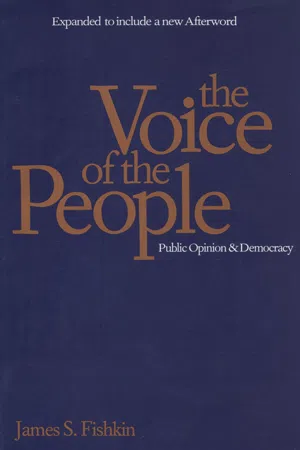The Voice of the People
About This Book
Ours is an era of stunted public discourse, where instant polls, 900 numbers, orchestrated petitions, and talk-show campaigning appear to have overwhelmed participatory democracy. What has become of the freely reasoned public debate and informed "consent of the governed" that, as cherished principle, we hold will produce better leaders and better public decisions? Where—or what—is the voice of the people today?
In this lively book, James Fishkin evaluates modern democratic practices and explains how the voice of the people has struggled to make itself heard in the past. He tells a fascinating story of changing concepts and practices of democracy, with examples that range from ancient Sparta to America's founders to the first Gallup polls to Ross Perot. He then develops the rationale for a new method—the "deliberative opinion poll"—that uses modern media and survey research to legitimately rediscover the people's voice.
Fishkin's proposal for televised deliberative opinion polls has already been realized twice by the British television network Channel 4, and he discusses its implementation in the book. In January 1996, his deliberative poll will be seen in action in a "National Issues Convention" to be broadcast by PBS on the eve of the American presidential primary season. During this broadcast, a national random sample of citizens will interact with presidential contenders in order to reflect and vote on the issues and candidates. Fishkin discusses the pros and cons of this important event, giving behind-the-scenes details about preparations for it.
Here then is a compelling story of citizen deliberation from ancient Athens to the present, setting the context for future deliberative polls and related efforts to reinvigorate our public dialogue.
Frequently asked questions
Information
Table of contents
- CONTENTS
- ACKNOWLEDGMENTS
- l INTRODUCTION
- 2 WHO SPEAKS FOR THE PEOPLE?
- 3. HOW "PUBLIC OPINION " BECAME THE VOICE OF THE PEOPLE
- 4 WHO ARE THE PEOPLE?
- 5 GIVING THE PEOPLE VOICE
- AFTERWORD The National Issues Convention and Beyond
- APPENDIX A The First Deliberative Poll: Summary of Results
- APPENDIX B Who Came? Some Comparisons of Weekend Sample to Entire Baseline Survey (in Percentages)
- APPENDIX C . Comparison of Sample Delegates with U.S. Census Data
- APPENDIX D Eight Deliberative Polls, 1994-97: How Participants Change (Selected Results)
- APPENDIX E Do the Changes Last? British Deliberative Poll on Crime
- APPENDIX F How Participants Evaluated the Process at the NIC
- APPENDIX G National Issues Convention Committees and Advisory Board
- NOTES
- INDEX
